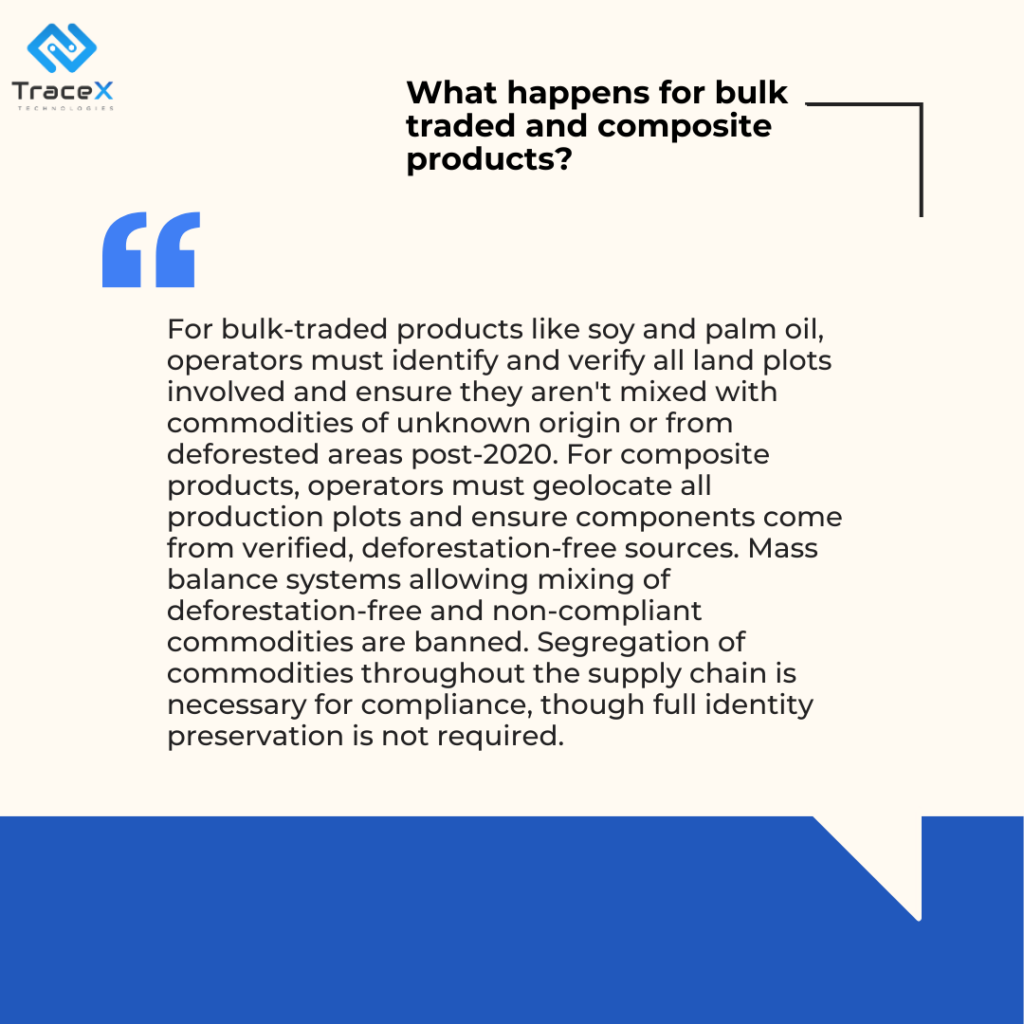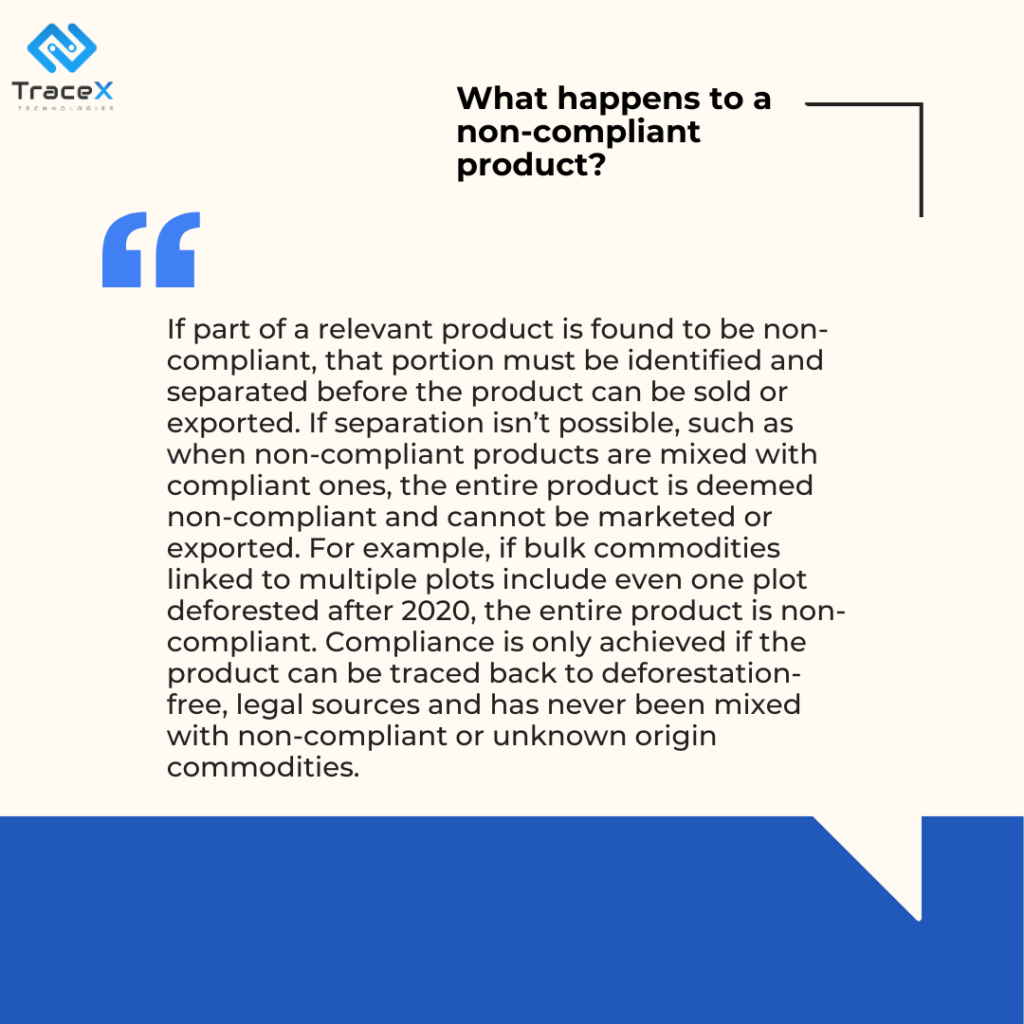Contact: +91 99725 24322 |
Menu
Menu
Quick summary: Learn how to build a reliable chain of custody for EUDR compliance with this step-by-step guide. Discover best practices for traceability, batch tracking, and due diligence to protect market access and reduce compliance risks.

Your EU-bound shipment may have all the right certifications—but without a clear chain of custody, it could still be rejected. “For agri-exporters, processors, and compliance heads navigating the evolving EU Deforestation Regulation (EUDR), Chain of Custody in EUDR Compliance is emerging as the make-or-break factor. The regulation doesn’t just demand sustainable sourcing—it requires proof of product origin, ownership flow, and deforestation-free land use at every stage.
The challenge? Most supply chains are still operating on fragmented systems, spreadsheets, or trust-based verbal commitments. In a world where “show, don’t tell” is the new compliance standard, gaps in chain of custody could mean shipment delays, lost contracts, or regulatory penalties. In this blog, we unpack what chain of custody really means in the EUDR context, why it’s business-critical, and how companies can build end-to-end transparency—without slowing down their operations.
Key Takeaways
Imagine your product—whether it’s cocoa, rubber, palm oil, or timber—making its journey from the farm to the EU market. At every handoff—from the farmer to the aggregator, the processor, the exporter, and finally the importer—the chain of custody answers one critical question:
“Can we prove exactly where this product came from, who handled it, and whether it meets the EU’s deforestation-free criteria?”
Under the EU Deforestation Regulation (EUDR), it’s no longer enough to just say your supply chain is sustainable—you need to prove it with traceable, timestamped, and tamper-proof data. That’s where chain of custody becomes the backbone of compliance.
For companies dealing with fragmented, informal, or manual processes, this is a wake-up call. Verbal assurance from a supplier? Doesn’t hold up. A shared spreadsheet between middlemen? Not traceable. Certificates without origin-linked batches? Not enough.
The EUDR requires a Due Diligence Statement (DDS) for every shipment, with supporting evidence like:
If even one link in this chain is broken or unverifiable—your shipment, no matter how high quality, risks being flagged, delayed, or rejected by EU customs.
One cocoa exporter in West Africa thought they were compliant because all their farmers were certified. But when an EU buyer asked for plot-level traceability with mapped geolocation for each batch, they hit a wall. Certifications weren’t linked to actual batches. Farms weren’t geo-mapped. And no digital trail existed. They lost the deal.
That’s why a secure, digital chain of custody isn’t just a compliance tool—it’s a competitive advantage. It protects your market access, gives buyers confidence, and reduces the chaos of last-minute audits or documentation requests.
“Chain of custody” sounds like something only lawyers or logistics pros care about. But if you’re a sustainability manager, compliance lead, or agri-exporter trying to crack the EUDR code, this concept is your new best friend.
A strong chain of custody isn’t just a digital document trail. It’s a system of trust—not based on promises, but on verifiable, time-stamped, auditable data that proves where a product came from, who touched it, and how it moved.
So, what makes up a strong chain of custody for EUDR compliance?
Every batch must start with farm-level geolocation data. That means exact GPS coordinates—not just the village name or district. You need to know where the product originated, and prove it’s not from deforested land.
Think of this like tagging each farm with a digital fingerprint. No fingerprint = no entry to the EU.
Are the farmers operating on legal land? Do they have tenure rights? Can you validate it with documentation?
This step is where many supply chains break—especially when working with smallholders who lack formal land titles. But even if paperwork is informal, the verification process must be recorded, and traceable to the batch.
Consider using digital surveys or mobile tools to document legality—at scale.
Here’s where the magic happens: Each batch needs a unique identifier (e.g., batch ID, QR code, token). This ID must follow the product through all handoffs—from farmer to processor to shipper.
Why? Because the EUDR Due Diligence Statement (DDS) requires you to map each EU-bound shipment to its deforestation-free source.
Without batch-level IDs, you can’t connect farm GPS to the exported product.
Every time the product changes hands—say, from cooperative to processor—you need a digital log of that transaction. Think: date, time, quantity, who transferred to whom.
Without this? You have a black hole in your traceability trail. And under EUDR, one broken link can collapse the whole chain.
This is where digital platforms shine—automating logs, reducing errors, and preventing fraud.
It’s not just about collecting data—it’s about storing it securely. EU auditors want verifiable proof that hasn’t been altered or faked.
That’s why many exporters are turning to blockchain-backed traceability systems. They offer a tamper-evident record of events, improving trust with buyers and certifiers alike.
Your traceability system should act like a digital vault—not a leaky spreadsheet.
This is the endgame. All that batch, GPS, custody, and legality data must feed into an automated DDS report that’s submitted to the EU Information System for every shipment.
Think of DDS as your golden ticket into the EU market. No ticket? No trade.
Building a strong chain of custody isn’t just about ticking boxes. It’s about building a transparent, resilient, and defensible supply chain—one that opens doors to global markets and shields your business from regulatory risk.
Because in 2025, it’s not just about what you sell.
It’s about what you can prove—and how fast you can prove it.

If you’ve ever tried to track a product from farm to export using paper receipts, Excel sheets, or WhatsApp updates, you already know—traditional supply chains are not built for EUDR.
They’re messy. They’re manual. They’re impossible to audit.
Now imagine trying to do that not just for one batch—but for hundreds, with GPS data, land legality proof, custody logs, and a Due Diligence Statement (DDS) for each shipment to the EU.
Sounds exhausting, right? That’s why digital traceability platforms are quickly becoming the backbone of EUDR compliance.

Instead of chasing farmers for coordinates or scanning satellite images manually, digital platforms let you:
You’re not just ticking a regulatory box—you’re building trust with your EU buyer before your shipment even leaves port.
With digital procurement tools, every batch you collect:
This is where chain of custody begins—not in the warehouse, but at the farmgate.
Think of each batch like a passport—it needs a clean, traceable history.
As the product moves—from farmer to aggregator, processor, exporter—digital logs track every handover, time-stamped and geotagged. No spreadsheets. No gaps. No guesswork.
You’ll always know:
Your audit trail writes itself. Literally.
Platforms like TraceX don’t just track—they assess risk.
Now you’re not just reacting—you’re protecting your brand and your buyer relationships in real time.
See How a Global Tire Brand Nailed EUDR Compliance with TraceX
Discover how real-time traceability, automated DDS, and deforestation risk mapping helped streamline natural rubber sourcing for EU markets.
[Read the Case Study] and future-proof your compliance journey.
Once all the data is linked—GPS, legality, custody, batch details—the platform auto-generates the DDS in a format that’s ready for submission to the EU system.
Because the goal isn’t just compliance—it’s efficiency at scale.

Exporters, processors, auditors, field agents—everyone logs into the same platform, but only sees what they need.
It’s not just software—it’s an ecosystem.
You can’t build EUDR compliance on spreadsheets.
And you shouldn’t have to build a system from scratch either.
Digital traceability platforms give you the speed, control, and confidence to prove deforestation-free sourcing, even in the most complex supply chains.
TraceX EUDR Compliance Platform is a purpose-built digital solution designed to streamline and secure the chain of custody for forest-risk commodities. From farm-level geolocation and land legality verification to batch-level traceability, custody transfers, and automated Due Diligence Statement (DDS) generation, TraceX enables exporters, processors, and importers to maintain unbroken, verifiable, and audit-ready supply chain data. With blockchain-backed records, geospatial intelligence, and mobile-first field tools, TraceX ensures compliance with the EU Deforestation Regulation—while reducing operational friction and building buyer trust across global value chains.
1.Geo-Coordinates and Import Tracking: The platform utilizes geo-coordinates (in formats like GeoJSON or polygon) for onboarded raw materials. This geo-location data allows precise tracking of the origin of raw materials, ensuring that each batch can be traced back to its source. This feature is crucial for verifying that materials comply with EUDR requirements by confirming they come from deforestation-free sources.
2. EUDR Reporting: The platform facilitates comprehensive EUDR reporting against any objects in the supply chain. Whether dealing with single or multiple JSONs, the platform supports detailed reporting and monitoring of compliance status. This capability ensures that businesses can generate accurate reports for internal audits and regulatory submissions, maintaining adherence to EUDR requirements.
3. Batch Compliance Flagging: The platform flags batches as compliant or non-compliant based on their deforestation status. This includes handling raw produce, aggregated materials, and onboarded goods. By categorizing batches effectively, it ensures that only products meeting EUDR standards are allowed to proceed through the supply chain.
4. Rule-Based Restrictions: The platform sets rules to restrict sales, transfers, and manufacturing activities for non-compliant batches. This functionality prevents the distribution and use of materials that do not meet EUDR criteria, thus maintaining the integrity of the supply chain and ensuring that all products in the market are in compliance with the regulation.
Everyone talks about chain of custody as a way to pass audits or meet EU requirements. But what no one’s talking about is how a transparent chain of custody can actually level the playing field for smallholders and ethical suppliers.
When done right, it doesn’t just prove where the product came from—it proves who did the right thing in the value chain.
It can:
In a global race for compliance, visibility = power. A digital chain of custody gives smaller actors the proof they need to participate in premium markets, access financing, and build lasting buyer relationships.
Maintaining an effective chain of custody is essential for EUDR compliance and achieving sustainability goals. By leveraging advanced traceability solutions and addressing common challenges, businesses can ensure that their products are tracked accurately from farm to distribution. A robust chain of custody system not only helps in meeting regulatory requirements but also enhances transparency, supports sustainability, and builds consumer trust. Investing in effective traceability solutions is a strategic choice that contributes to a more responsible and resilient supply chain.
It ensures a transparent, unbroken record of how commodities move through the supply chain—essential for proving deforestation-free sourcing and legal land use.
Farm-level geolocation, batch-level traceability, custody transfer logs, and verifiable documentation aligned with Due Diligence Statement (DDS) requirements.
They automate traceability, centralize supplier data, and generate real-time reports that streamline audits and reduce manual tracking errors.
